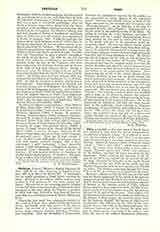

Pertinax , PUBLIUS HELVIUS, Roman Emperor (December 31, 192), b. at Alba Pompeia, in Liguria, August 1, 126; d. at Rome March 28, 193. A freedman’s son, he taught grammar at Rome before entering the army. Because of his military ability and his competence in civil positions, he was made praetor and consul. His services in the campaign against Avidius Cassius led Marcus Aurelius to give Pertinax the chief command of the army along the Danube, a position he filled with such distinction that Marcus Aurelius made him successively governor of Mcesia, Dacia, and Syria.
Commodus first made him commander-in-chief of the troops in Britain, then appointed him governor in Africa, and finally made him prefect of the city of Rome. On account of a conspiracy against Corn-modus many innocent persons, including Pertinax, were banished. After the strangling of Commodus, Pertinax was proclaimed emperor by the soldiers at the suggestion of Laetus, prefect of the praetorian guard. Pertinax had himself elected as head of the State once more by the senators and revived the title “Princeps Senatus”; on the first day of his reign he assumed the title “Pater Patrice”. Pertinax strove to restore order in the administration of the State. By selling at auction the costly furniture and plate of Commodus and by a frugal administration, before three months he was able to make gifts of money to the people and give to the praetorian guard the promised largess. He also was able to resume public works. He separated public lands from those belonging to the emperor, endeavored to bring about the resettling of deserted estates, to recall those arbitrarily banished, and to bring informers to trial. He refused the title of Augusta for his wife, or that of Caesar for his son until he had earned the honor. When the praetorians saw that the emperor meant to restore the ancient discipline and when the prefect Laetus noticed that he strove to limit his own influence, he aroused the soldiers of the guard against the emperor. After suppressing the revolt of the consul, Sossius Falco, Pertinax declined to put him to death, though the Senate had decreed his execution. Several praetorians were suspected of being members of the conspiracy; Laetus had these put to death without any trial and made the soldiers believe that it was done by imperial command. The praetorians now resolved to depose Pertinax. One evening a mob of about two hundred soldiers went to the palace to murder the emperor. The latter came out to them without arms in the hope of quieting them by his personal influence. His words impressed the mutineers and they put their swords back in the scabbards, when suddenly a Tongrian cavalryman fell upon Pertinax and stabbed him in the breast. This incited the others who fell upon Pertinax; the emperor’s head was put on a lance and carried through the streets of the city to the camp. Severus, the second successor of Pertinax, deified him.
KARL HOEBER

